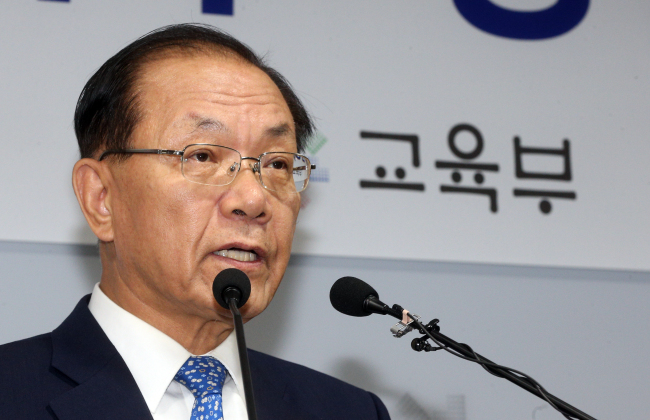Friction between the Education Ministry and local education offices over elite schools hinted at an escalation of conflict between Minister Hwang Woo-yea and progressive superintendents.
The ministry announced Monday that it would not approve Gyeonggi Provincial Office of Education’s attempt to strip the status of autonomous private high school from Dongsan Christian High School. Autonomous schools refer to those granted relative autonomy over curriculum in exchange for receiving no government subsidies.
“While it is true that Dongsan’s score on the GPOE’s evaluation was below the cutline, the school does not appear to be incapable of achieving its goal as an autonomous school. The ministry felt it would be preferable (for the GPOE) to help the school achieve its goals through consistent consulting,” a ministry official said.
All the other schools whose evaluation scores were submitted so far had been reauthorized.
The government, however, was stern on Seoul Education Chief Cho Hi-yeon’s attempt to reevaluate autonomous schools within his jurisdiction, saying that he should honor the results of the previous assessments. Cho had raised suspicion about the fact that nearly all schools have passed the assessment, and claimed the criteria ― set by his conservative predecessor and approved by the ministry ― were too lenient.
 |
Education Minister Hwang Woo-yea. (Yonhap) |
“We are hoping that the Seoul Metropolitan Office of Education will reach a reasonable decision on the matter,” the ministry said.
It was the first sign of possible feud between Minister Hwang and local education chiefs since he took the helm last week. According to officials, the decision on the elite schools was reached later than expected, which implies that the new minister put careful consideration into it.
Hwang, a political bigwig and a close confidant of President Park Geun-hye, has been known to disagree with Cho, GPOE chief Lee Jae-jung and 11 other progressive superintendents on many education policies. They include autonomous schools, the potential reintroduction of contentious state-authored textbooks, and deregistering of the left-leaning teachers’ union Korean Teachers’ and Education Workers Union.
Last week, the KTU and other left-leaning civic groups held protests outside the National Assembly while Hwang went through his confirmation hearing. They protested that he was politically biased as former head of the conservative Saenuri party.
Liberal superintendents have refrained from verbal attacks on the new minister as of yet; Lee already said that he will honor the ministry’s decision on Dongsan.
“Minister Hwang has a balanced view (on education), and I will respect and communicate with him,” Cho said later Monday when asked about the ministry’s announcement on the autonomous schools during a press conference.
But he made it clear he will not comply with the ministry’s ways.
“The evaluation process has not yet been completed because it has not been signed off by my predecessor. Most of my legal advisers said I am only exercising our own rights (by holding a reevaluation),” he said.
While it is most likely that the superintendents and Hwang are on a collision course, the impact may not be so colossal. As former head of Saenuri, Hwang has had abundant experience as a mediator during his political career, and officials are hoping this quality will help minimize the feud among the educational authorities.
“During Hwang’s days as a member of the parliamentary committee and education, culture and sports, he was known to be flexible in making decisions. We expect him to find an amicable way to settle his differences with the superintendents” said an Education Ministry official.
By Yoon Min-sik (
minsikyoon@heraldcorp.com)








